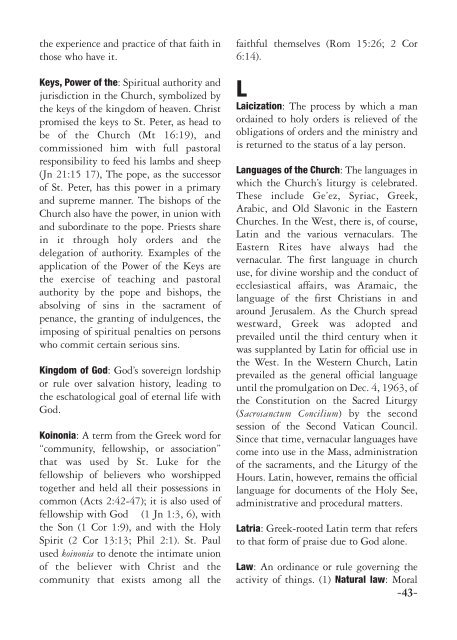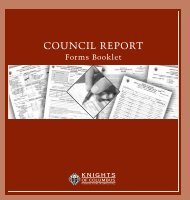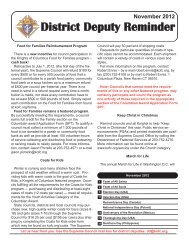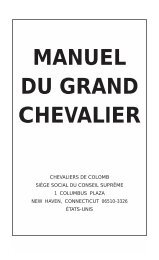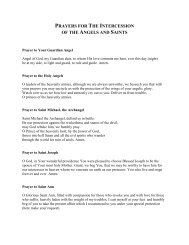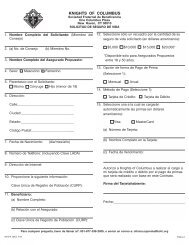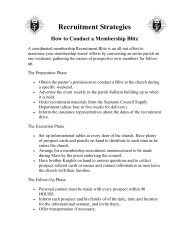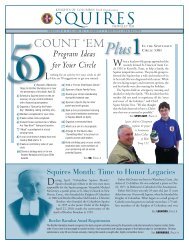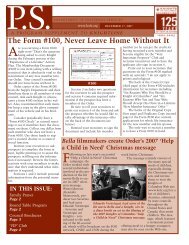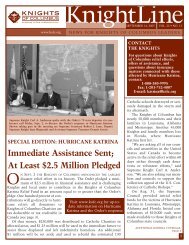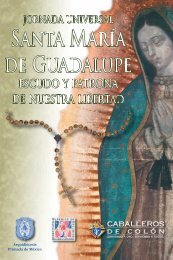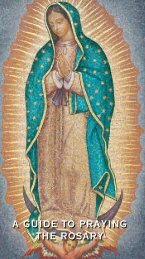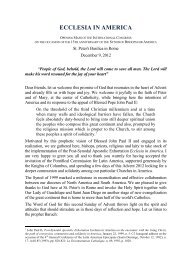CATHOLIC WORD BOOK - Knights of Columbus, Supreme Council
CATHOLIC WORD BOOK - Knights of Columbus, Supreme Council
CATHOLIC WORD BOOK - Knights of Columbus, Supreme Council
You also want an ePaper? Increase the reach of your titles
YUMPU automatically turns print PDFs into web optimized ePapers that Google loves.
the experience and practice <strong>of</strong> that faith in<br />
those who have it.<br />
Keys, Power <strong>of</strong> the: Spiritual authority and<br />
jurisdiction in the Church, symbolized by<br />
the keys <strong>of</strong> the kingdom <strong>of</strong> heaven. Christ<br />
promised the keys to St. Peter, as head to<br />
be <strong>of</strong> the Church (Mt 16:19), and<br />
commissioned him with full pastoral<br />
responsibility to feed his lambs and sheep<br />
(Jn 21:15 17), The pope, as the successor<br />
<strong>of</strong> St. Peter, has this power in a primary<br />
and supreme manner. The bishops <strong>of</strong> the<br />
Church also have the power, in union with<br />
and subordinate to the pope. Priests share<br />
in it through holy orders and the<br />
delegation <strong>of</strong> authority. Examples <strong>of</strong> the<br />
application <strong>of</strong> the Power <strong>of</strong> the Keys are<br />
the exercise <strong>of</strong> teaching and pastoral<br />
authority by the pope and bishops, the<br />
absolving <strong>of</strong> sins in the sacrament <strong>of</strong><br />
penance, the granting <strong>of</strong> indulgences, the<br />
imposing <strong>of</strong> spiritual penalties on persons<br />
who commit certain serious sins.<br />
Kingdom <strong>of</strong> God: God’s sovereign lordship<br />
or rule over salvation history, leading to<br />
the eschatological goal <strong>of</strong> eternal life with<br />
God.<br />
Koinonia: A term from the Greek word for<br />
“community, fellowship, or association”<br />
that was used by St. Luke for the<br />
fellowship <strong>of</strong> believers who worshipped<br />
together and held all their possessions in<br />
common (Acts 2:42-47); it is also used <strong>of</strong><br />
fellowship with God (1 Jn 1:3, 6), with<br />
the Son (1 Cor 1:9), and with the Holy<br />
Spirit (2 Cor 13:13; Phil 2:1). St. Paul<br />
used koinonia to denote the intimate union<br />
<strong>of</strong> the believer with Christ and the<br />
community that exists among all the<br />
faithful themselves (Rom 15:26; 2 Cor<br />
6:14).<br />
L<br />
Laicization: The process by which a man<br />
ordained to holy orders is relieved <strong>of</strong> the<br />
obligations <strong>of</strong> orders and the ministry and<br />
is returned to the status <strong>of</strong> a lay person.<br />
Languages <strong>of</strong> the Church: The languages in<br />
which the Church’s liturgy is celebrated.<br />
These include Ge’ez, Syriac, Greek,<br />
Arabic, and Old Slavonic in the Eastern<br />
Churches. In the West, there is, <strong>of</strong> course,<br />
Latin and the various vernaculars. The<br />
Eastern Rites have always had the<br />
vernacular. The first language in church<br />
use, for divine worship and the conduct <strong>of</strong><br />
ecclesiastical affairs, was Aramaic, the<br />
language <strong>of</strong> the first Christians in and<br />
around Jerusalem. As the Church spread<br />
westward, Greek was adopted and<br />
prevailed until the third century when it<br />
was supplanted by Latin for <strong>of</strong>ficial use in<br />
the West. In the Western Church, Latin<br />
prevailed as the general <strong>of</strong>ficial language<br />
until the promulgation on Dec. 4, 1963, <strong>of</strong><br />
the Constitution on the Sacred Liturgy<br />
(Sacrosanctum Concilium) by the second<br />
session <strong>of</strong> the Second Vatican <strong>Council</strong>.<br />
Since that time, vernacular languages have<br />
come into use in the Mass, administration<br />
<strong>of</strong> the sacraments, and the Liturgy <strong>of</strong> the<br />
Hours. Latin, however, remains the <strong>of</strong>ficial<br />
language for documents <strong>of</strong> the Holy See,<br />
administrative and procedural matters.<br />
Latria: Greek-rooted Latin term that refers<br />
to that form <strong>of</strong> praise due to God alone.<br />
Law: An ordinance or rule governing the<br />
activity <strong>of</strong> things. (1) Natural law: Moral<br />
-43-


